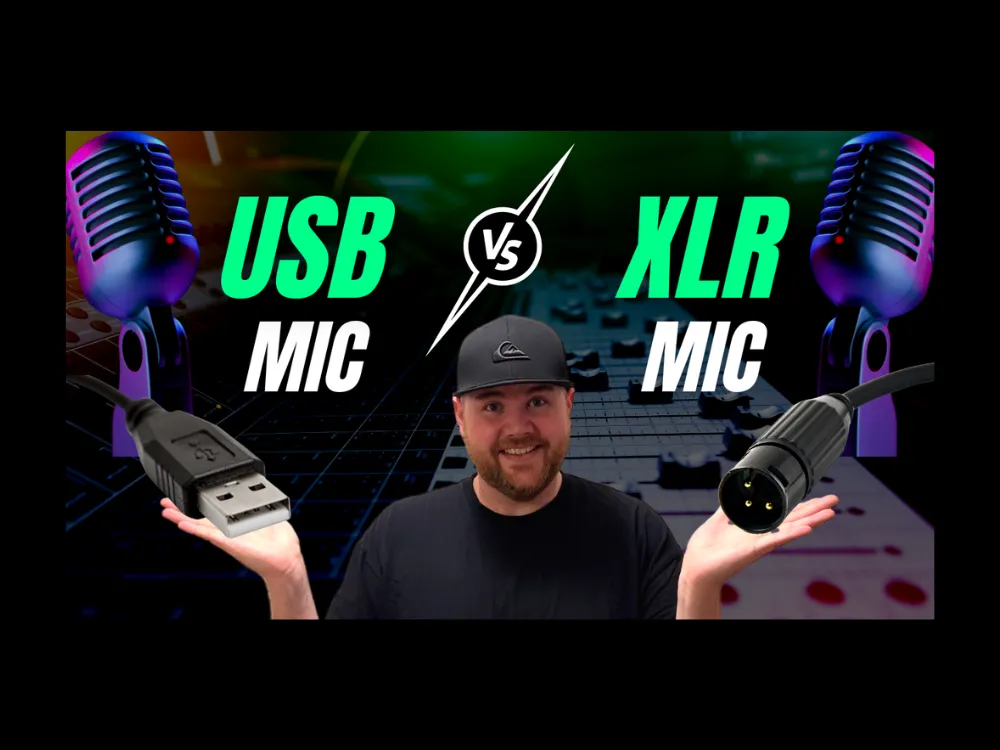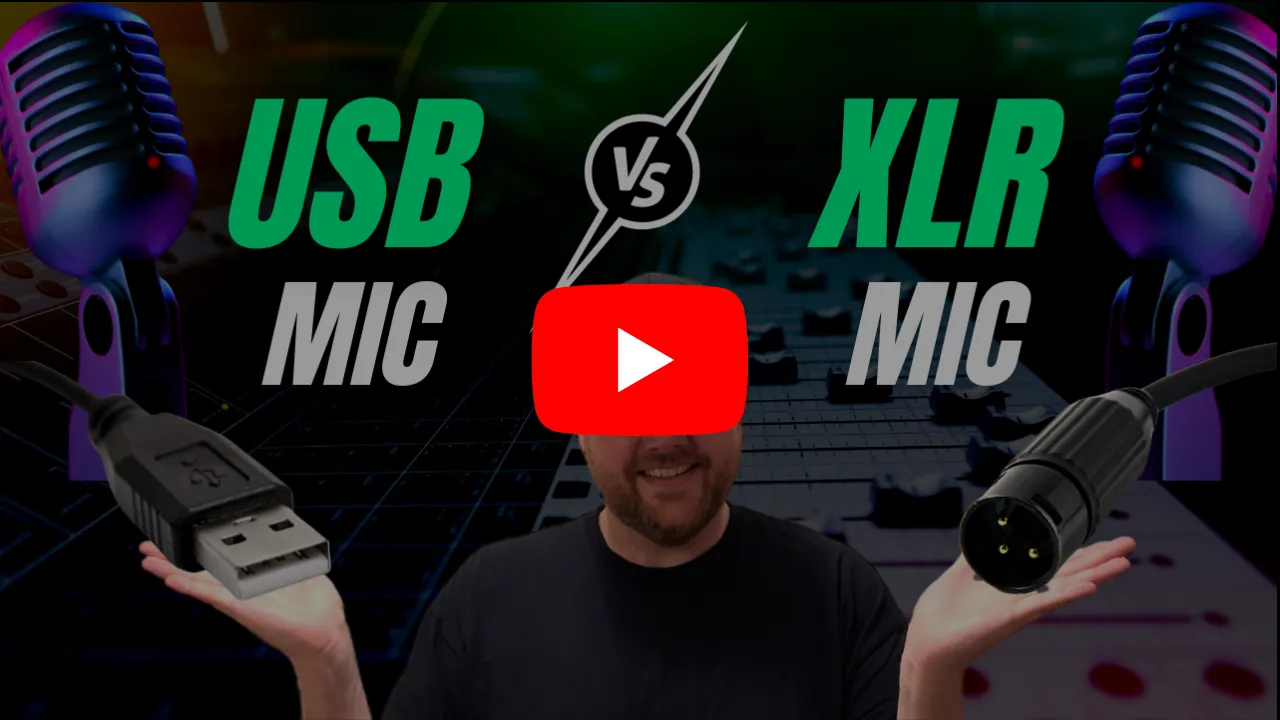What’s the best microphone for home studio recording? Are USB mics good in a studio setting?
These are the questions you may be asking yourself when putting together your first studio setup. In this USB vs XLR microphone comparison, Justin provides insight into which to choose for your unique recording situation.
Choosing which home studio mics to buy on a budget might have you spending hours browsing music retailer websites, googling “budget microphone review” or “best budget studio mic review”, and you still feel stuck not knowing what to buy or where to begin. While there isn’t necessarily one “best recording studio microphone” out there, there are plenty of great options that will give you studio-quality sound without breaking the bank.
If you're a beginner navigating the vast world of home recording, a USB studio mic is a hassle-free entry point. These mics are not only easy to use but also very versatile. They can be great vocal recording mics and are ideal for recording music, podcasting, interviews, and more. With a built-in preamp and converter, the USB microphone setup process is very straightforward and can eliminate the need for additional equipment.
The portability factor of USB mics makes them a go-to choice for on-the-go professionals. No more lugging around multiple cables and gear – with a USB vocal mic, you can effortlessly capture vocal demos wherever inspiration strikes.
However, it's essential to consider the limitations. a USB mic is confined to USB connectivity, restricting future expansions if your studio evolves. This is where XLR mics shine.
XLR microphones offer a wide range of possibilities for your home studio. From connecting to an audio interface to integrating with a mixer or preamp, XLR mics provide the versatility needed for expanding your setup.
While the initial investment for XLR microphones may be higher due to the need for an audio interface or mixer, the long-term benefits justify the cost.
Whether you're a beginner deciding on a USB condenser microphone vs XLR, or an aspiring pro aiming for a versatile and expandable setup, this video helps you navigate the XLR vs USB dilemma. Learn essential USB Microphone Tips and home studio microphone tips, ensuring you make the right choice for your studio.
My Products
► Massive Drops - 240 Different Sub Hit And Sub Drop Samples
► Ocean Banjo - Virtual Banjo Instrument. Real Recorded Banjo Right At Your Fingertips
► Ocean Banjo Patterns - Virtual Banjo Patterns At The Click Of A Button
By purchasing one of my virtual instruments or sample packs, you will help to support From Zero To Studio so I can continue providing you with valuable content.
My Favorite Tools
► Easy Funnels - A Website and Funnel Builder for Recording Studios
► Distrokid - Music Distribution For Musicians
► Backblaze - Unlimited Data Backup for only $7/month
Some of these links above are affiliate links where I earn a very small commission at no additional cost to you. You have no obligation to purchase through these links, but it does help to support From Zero To Studio so I can continue providing you with valuable content.
Video Links
Automatic Video Transcript
In the heart of every home recording studio is a vocal mic. Many of us started our home studios because we wanted to record our own music and we had a desire to capture powerful vocals like we've heard on some of our favorite songs. In the past, XLR mics have been the standard across the board, but in recent years there’s been a new kid in town, and that is the USB microphone.
So for your first studio microphone, should you choose a USB mic or an XLR mic? Let’s discuss.
If you’re just getting started with all of this home studio stuff and searching for a microphone, you probably finding so many different types and prices for what basically seems the same piece of gear. Maybe you’re just wanting to test the waters to try recording your music for the first time and you don’t want to invest a ton of money to get started. Or maybe you just want an easy, portable recording solution to capture your music on the road, or wherever inspiration strikes. If that sounds like where you are currently at, consider getting a USB microphone.
So why choose a USB microphone? Well, for one, they’re easy to use.
A USB microphone is a hassle-free way to get started in the world of recording music. They don't require any additional equipment, and they’re great for recording music, podcasts, interviews, or whatever else you want to throw at it. Although these mics are sometimes looked at as “entry-level” type gear, the truth is, USB mics are made up of the same components as XLR mics. The main difference is that they also include an onboard preamp and a converter that changes the signal from analog to digital.
With the inclusion of this preamp and converter, you don’t have to have any type of audio interface or mixer. You just plug one single cable into your computer, select it as the input source within your audio settings, and you’re ready to go. Also, USB mics typically have a built-in headphone jack which means that hearing yourself through a pair of headphones is as simple as plugging them in. That makes for fewer cables, less gear, and a simpler way to get started recording your music.
Another reason you might choose a USB mic is that they’re extremely portable.
The portability factor alone is a huge win and has even made USB mics an optimal choice for professionals on the go. Gone are the days of packing an interface, multiple cables, and power supply units to be able to set up your recording rig. You can easily record vocal demos on a tour bus, in a hotel room, or even on the beach if you wanted.
So those are the pros, what are the cons?
The downside to using a USB mic is that you can only use it with USB. If your recording studio starts to grow, or if you purchase an interface or any additional gear, you won’t be able to connect that mic to that gear.
So what about an XLR microphone?
The best thing about XLR microphones is flexibility.
If you plan on expanding your home studio at any point, an XLR mic is the way to go. XLR mics typically connect to your computer through an audio interface, which converts the analog signal to digital. They can be used with a standalone mixer, they can be connected to an external preamp, or can even be used in a live setting if you want.
Another reason, XLR mics provide Less noise and typically have a much cleaner sound.
Since USB mics have the preamp and converters built right into the microphone, there can be more circulatory noise from these electronic parts that could be transferred to your recordings. Once you start using any sort of compression or raising the volume of the track, the volume of that noise is going to raise up as well. It’s possible to still encounter electrical noise when recording with an XLR microphone, but typically the sound is not coming from within the internals of the microphone unless it’s damaged in some way.
Did I say flexibility? Oh, Wait! Here's more!
Another advantage of an XLR mic is that you’re not contained to the immediate area of your computer when recording. If you need to run a cable to another room or a vocal booth, you can easily do so without being limited to the 6 to 10 feet of cable that most USB mics provide.
You also have the option to connect and record multiple microphones at the same time if your interface allows it. So if you plan on recording drums, or even your acoustic guitar and vocals at the same time, you can plug each mic into a separate input on your interface, and they’ll both be on separate tracks with inside your recording software.
So are there any downsides to XLR mics?
With XLR mics, the initial investment is more because you have to purchase an audio interface or a mixer to be able to connect it to your computer, but it’s definitely worthwhile if you plan to continue recording music.
Ultimately, the type of microphone you choose for your home studio is going to be based on your current and future recording needs, and your budget. But if you’re just starting out, a USB microphone is a great option because it is less expensive to get up and running, and it’s often easier to use. However, if you already have an audio interface or you’re planning on putting together a more functional and expandable home recording studio, I recommend going with an XLR mic.
Last but not least, if you want a guide that covers some of the best gear options for home studios, you can download The Ultimate Home Studio Gear Guide.
This guide has some of my best gear recommendations for every budget, and you can download it absolutely free as my gift to you by going to FromZeroToStudio.com/Gear and you’ll be ahead of the game when it comes to making your next gear purchase.
That’s all I’ve got for you today. Thank you so much for watching and subscribing. I’ll see you on another video soon.



